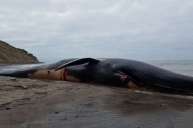While taking in beautiful sights at the beach is not uncommon, beachgoers got a special sight the other day. Hundreds of sea lions have taken over a California beach and are making it their own. Onlookers enjoy the spectacle as this massive group of sea mammals make a show out of lounging on the beach.
A New Type of Beachgoer
While humans cannot use this beach right now, hundreds of sea lions take full advantage of its sandy shores. San Carlos Beach in Monterey is closed to the public as these sea lions enjoy it for their own personal use. Although people cannot put their toes in the sand while these marine mammals are visiting, that does not stop them from being enthusiastic onlookers.
People gather around this California beach to take photos and videos of this spectacle. However, no one gets too close. Inside Edition claims that experts say you should stay "at least 50 feet away from a sea lion for safety reasons." While they appear cute and cuddly, they have sharp teeth and claws that could easily injure someone.
Hundreds of Sea Lions On California Beach

Stretch of beach in the northern portion of coastal San Diego County in the city of Carlsbad.
These hundreds of sea lions migrated north from the Channel Islands. Although these migratory patterns are common, locals claim seeing so many in one area is rare. While it is unclear why these animals chose this beach specifically, experts have their theories. Lisa Uttal, a Monterey Bay National Marine Sanctuary marine biologist, told the NY Post that there could be "rich diversity in the ecosystem's food supply."
She also pointed out that all the sea lions gathered on the Califonia beach were males. She expects them lions to stay on the beach for three to four weeks. The hundreds of sea lions are most likely on the beach because "they're usually chasing food, and because Monterey Bay National Marine Sanctuary is so productive out here, their productivity is really rich."
While it is an impressive sight, onlookers were asked not to disturb the sea lions, not only for their own safety but for the safety of the sea lions. These animals are protected by the U.S. Marine Mammal Protection Act of 1972. This means that not only is harming them subject to a fine, but the act also "prohibits people from changing the behavior of the sea lions, meaning that approaching too close or forcing them to flee is a violation."




